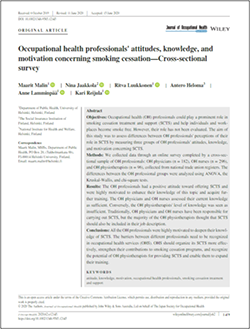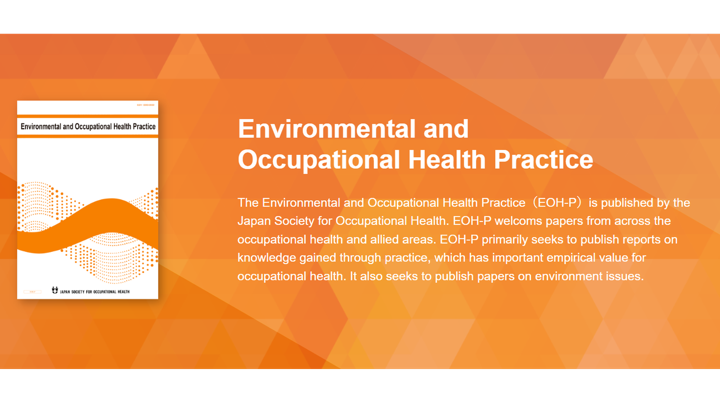#0053 Occupational health professionals' attitudes, knowledge, and motivation concerning smoking cessation—Cross‐sectional survey

The Role Occupational Health Professionals Can Play in Smoking Cessation Treatment and Support
Smoking is the largest preventable cause of disease in the developed world. Even though a significant number of smokers want to quit smoking, they could do with a little help from health professionals who offer smoking cessation treatment and support (SCTS) as part of their standard care practice.
There are reasons to believe that SCTS, if administered by occupational health (OH) professionals, can greatly impact the lives of smokers. Firstly, SCTS is known to have a positive impact on the tobacco-related practices of OH professionals themselves who are familiar with it. Secondly, smokers tend to be more agreeable to quitting when two or more health professionals take interest in their cases; their chances of quitting double under such circumstances. Lastly, OH professionals are primarily responsible for promoting their patients’ health; so, SCTS would naturally appeal to them if it is effective.
In a developed country like Finland, where occupational health services (OHS) encompass 90% of the workforce and OH professionals have direct access to smokers, how do these professionals perceive SCTS?
To investigate this, we assessed and compared the knowledge, attitudes, and motivation of three groups of OH professionals in providing SCTS. We surveyed a cross-sectional sample comprising 182 physicians, 296 nurses, and 96 physiotherapists, online, covering aspects like their cessation practices, familiarity with the Finnish guidelines on tobacco, motivation to receive further training, and more.
We found that OH professionals possess a positive attitude toward SCTS. Overall, 93.8% of the professionals reported that SCTS should be part of their job description, even though 42.7% of physiotherapists reported this had not been part of theirs at the time of the survey. Nonetheless, most attitude-related statements received high scores from all OH professionals, which demonstrated their interest in supporting SCTS.
OH physicians and nurses were sufficiently familiar with SCTS information, while physiotherapists were insufficiently so. Regardless of this difference, all groups demonstrated great willingness to increase their knowledge through training, especially on the methods of implementing SCTS and evaluating their effectiveness.
These findings demonstrate the tremendous potential for the role that OH professionals can play in SCTS. Physiotherapists, especially, represent a vital resource that has thus far been unused in SCTS implementation.
With proper training and a multi-professional approach that combines the expertise of a physician, nurse, and physiotherapist in administering SCTS, the OHS can improve the quality of its smoking cessation programs, thereby helping smokers quit smoking.

Link to the original journal article:
https://onlinelibrary.wiley.com/doi/10.1002/1348-9585.12145
Title of the paper:
Occupational health professionals' attitudes, knowledge, and motivation concerning smoking cessation—Cross‐sectional survey
Authors:
Maarit Malin, Nina Jaakkola, Ritva Luukkonen, Antero Heloma, Anne Lamminpää, Kari Reijula




